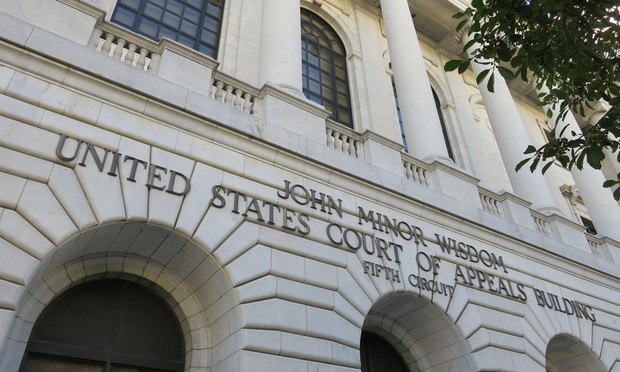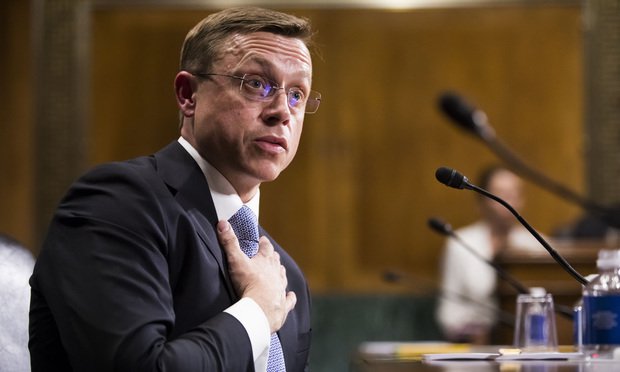5th Circuit Questions Pro-Abortion Claims but Won't Block Sweeping New Suit
The three-judge appeals panel described the abortion case as "extraordinary" because the plaintiffs, represented by a team from Debevoise & Plimpton, seek to challenge a raft of state laws under a "cumulative effects" theory.
October 18, 2019 at 12:17 PM
5 minute read
 U.S. Court of Appeals for the Fifth Circuit. Photo: Mike Scarcella/ALM
U.S. Court of Appeals for the Fifth Circuit. Photo: Mike Scarcella/ALM
A federal appeals court on Friday refused to stop a sweeping challenge to abortion regulations in Louisiana, but the ruling requires the plaintiffs to show why they believe they have a legal foundation to bring their claims in the first place.
The U.S. Court of Appeals for the Fifth Circuit's unsigned ruling rejected the state's request for a writ of mandamus, a rare order that could have stopped the claims short before they're fully aired. The case was closely watched, as a ruling in favor of Louisiana could have had broader implications across the Fifth Circuit. Lawyers for Texas and Mississippi supported Louisiana's push to stop the federal litigation from proceeding.
The three-judge panel described the abortion case as "extraordinary" because the plaintiffs, represented by a team from Debevoise & Plimpton, seek to challenge a raft of state laws under a "cumulative effects" theory. That theory is "unprecedented," according to the appeals court. The appeals court sent the case back to the lower court to assess whether the plaintiffs have legal "standing" to bring their claims.
"The plaintiffs' theory, as we understand it, is that Louisiana's various laws and regulations regarding abortion cumulate to an undue burden," the opinion stated. "But before any federal court can analyze the 'cumulative effects' of Louisiana's laws, we must know which laws plaintiffs have standing to challenge. Again, jurisdiction first."
The U.S. Supreme Court has not "blessed such a claim," and to the contrary has analyzed abortion provisions separately, the Fifth Circuit panel said. Chief Judge Priscilla Owen heard the case with Judges Don Willett and Andrew Oldham.
 Andrew Oldham testifies at his confirmation hearing. Photo: Diego M. Radzinschi/ALM
Andrew Oldham testifies at his confirmation hearing. Photo: Diego M. Radzinschi/ALMThe Supreme Court will hear arguments this term in another Louisiana abortion case: June Medical Services v. Gee. That case challenges the state requirement that abortion physicians have hospital admitting privileges within 30 miles of an abortion facility.
The appeals court ruling Friday called Louisiana's efforts to stop the case a "close call" but said for various reasons that the court would not issue—at least for now—a writ of mandamus. The federal district court trial judge must review whether and how the plaintiffs have "standing" to challenge individual provisions.
"It's theoretically possible these provisions could injure plaintiffs," the panel stated. "But Article III requires more than theoretical possibilities."
The appeals court expressed concern about the possible "astronomical" legal fees that Louisiana could be on the hook to pay, if the state loses.
The court pointed to the $2.5 million in fees and expenses that were awarded in August 2019 to the challengers in the case Whole Woman's Health v. Hellerstedt. The lawyers for the challengers included a team from the major U.S. law firm Morrison & Foerster.
 Debevoise & Plimpton sign. Photo: Rick Kopstein/ALM
Debevoise & Plimpton sign. Photo: Rick Kopstein/ALM"Regardless of whether plaintiffs prevail in this case, the mere prospect of shifting Debevoise & Plimpton's multi-million-dollar fee request to the shoulders of Louisiana's taxpayers will force the state to litigate this case in ways that are far from ordinary," the Fifth Circuit said in its ruling Friday.
Debevoise & Plimpton partner Shannon Rose Selden in New York, the attorney who argued the case in the Fifth Circuit for the plaintiffs, said Friday she's pleased the panel rejected the state's petition.
"The state can't use mandamus as a fast-track to bypass the district court and appeal process," she said. "Now the case will return to the trial court where it belongs."
She added that although the opinion contained the Fifth Circuit's thoughts about the case, those opinions were purely advisory and nonbinding under the Fifth Circuit's own precedent.
The law firm represented the plaintiffs for free as part of its normal pro bono practice, which is dedicated to protecting women's reproductive health care rights, Selden said.
"We fortunately represent doctors, clinics, patients and leading medical organizations, in courts across the country, seeking to make sure that women and girls have access to the full slate of reproductive health care, including abortion care, and their substantive due process rights are protected," Selden said. "We work hard on behalf of individual clients and amicus parties to make sure those rights are vindicated."
Louisiana Attorney General Jeff Landry said in a statement: "This lawsuit was always an overreach—it was filed by abortion clinics and doctors with poor safety records to evade regulation, even on common sense safety measures that benefit and protect women. We are gratified that the Fifth Circuit reaffirmed very basic rules that apply when State laws are challenged in federal courts."
Texas Solicitor General Kyle Hawkins, who wrote an amicus brief for the State of Texas, also was not immediately reached for comment.
Read Friday's Fifth Circuit ruling here:
Read more:
Texas and Louisiana Tout Pro-Trump Emoluments Ruling to Defend Abortion Restrictions
Justices Take Louisiana Abortion Case, Marking Major New Term
The Justices Had 5 Votes to Overturn 'Roe' in 1992. Why That Didn't Happen.
DC Circuit Rejects Trump's Blanket Ban on Immigrant Minors' Abortions
This content has been archived. It is available through our partners, LexisNexis® and Bloomberg Law.
To view this content, please continue to their sites.
Not a Lexis Subscriber?
Subscribe Now
Not a Bloomberg Law Subscriber?
Subscribe Now
NOT FOR REPRINT
© 2025 ALM Global, LLC, All Rights Reserved. Request academic re-use from www.copyright.com. All other uses, submit a request to [email protected]. For more information visit Asset & Logo Licensing.
You Might Like
View All
Standing Spat: Split 2nd Circuit Lets Challenge to Pfizer Diversity Program Proceed

Fight Over Amicus-Funding Disclosure Surfaces in Google Play Appeal

'Self-Diagnosed Nickel Allergy' Fails to Find Success in Med-Mal Suit, 8th Circuit Rules
5 minute read
How We Won: BraunHagey’s $56M Trademark Win Over Molson Coors Upheld by 9th Circuit
8 minute readTrending Stories
- 1'It's Not Going to Be Pretty': PayPal, Capital One Face Novel Class Actions Over 'Poaching' Commissions Owed Influencers
- 211th Circuit Rejects Trump's Emergency Request as DOJ Prepares to Release Special Counsel's Final Report
- 3Supreme Court Takes Up Challenge to ACA Task Force
- 4'Tragedy of Unspeakable Proportions:' Could Edison, DWP, Face Lawsuits Over LA Wildfires?
- 5Meta Pulls Plug on DEI Programs
Who Got The Work
Michael G. Bongiorno, Andrew Scott Dulberg and Elizabeth E. Driscoll from Wilmer Cutler Pickering Hale and Dorr have stepped in to represent Symbotic Inc., an A.I.-enabled technology platform that focuses on increasing supply chain efficiency, and other defendants in a pending shareholder derivative lawsuit. The case, filed Oct. 2 in Massachusetts District Court by the Brown Law Firm on behalf of Stephen Austen, accuses certain officers and directors of misleading investors in regard to Symbotic's potential for margin growth by failing to disclose that the company was not equipped to timely deploy its systems or manage expenses through project delays. The case, assigned to U.S. District Judge Nathaniel M. Gorton, is 1:24-cv-12522, Austen v. Cohen et al.
Who Got The Work
Edmund Polubinski and Marie Killmond of Davis Polk & Wardwell have entered appearances for data platform software development company MongoDB and other defendants in a pending shareholder derivative lawsuit. The action, filed Oct. 7 in New York Southern District Court by the Brown Law Firm, accuses the company's directors and/or officers of falsely expressing confidence in the company’s restructuring of its sales incentive plan and downplaying the severity of decreases in its upfront commitments. The case is 1:24-cv-07594, Roy v. Ittycheria et al.
Who Got The Work
Amy O. Bruchs and Kurt F. Ellison of Michael Best & Friedrich have entered appearances for Epic Systems Corp. in a pending employment discrimination lawsuit. The suit was filed Sept. 7 in Wisconsin Western District Court by Levine Eisberner LLC and Siri & Glimstad on behalf of a project manager who claims that he was wrongfully terminated after applying for a religious exemption to the defendant's COVID-19 vaccine mandate. The case, assigned to U.S. Magistrate Judge Anita Marie Boor, is 3:24-cv-00630, Secker, Nathan v. Epic Systems Corporation.
Who Got The Work
David X. Sullivan, Thomas J. Finn and Gregory A. Hall from McCarter & English have entered appearances for Sunrun Installation Services in a pending civil rights lawsuit. The complaint was filed Sept. 4 in Connecticut District Court by attorney Robert M. Berke on behalf of former employee George Edward Steins, who was arrested and charged with employing an unregistered home improvement salesperson. The complaint alleges that had Sunrun informed the Connecticut Department of Consumer Protection that the plaintiff's employment had ended in 2017 and that he no longer held Sunrun's home improvement contractor license, he would not have been hit with charges, which were dismissed in May 2024. The case, assigned to U.S. District Judge Jeffrey A. Meyer, is 3:24-cv-01423, Steins v. Sunrun, Inc. et al.
Who Got The Work
Greenberg Traurig shareholder Joshua L. Raskin has entered an appearance for boohoo.com UK Ltd. in a pending patent infringement lawsuit. The suit, filed Sept. 3 in Texas Eastern District Court by Rozier Hardt McDonough on behalf of Alto Dynamics, asserts five patents related to an online shopping platform. The case, assigned to U.S. District Judge Rodney Gilstrap, is 2:24-cv-00719, Alto Dynamics, LLC v. boohoo.com UK Limited.
Featured Firms
Law Offices of Gary Martin Hays & Associates, P.C.
(470) 294-1674
Law Offices of Mark E. Salomone
(857) 444-6468
Smith & Hassler
(713) 739-1250








